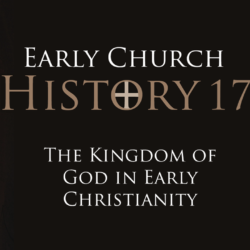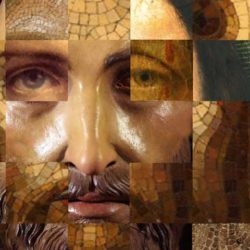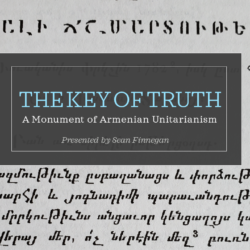 We’ve looked at how and why Christianity lost the kingdom message; in this episode you’ll learn how we got it back. Over the last five hundred years, three different movements have made significant strides in recovering the kingdom: the Anabaptists (16th century), the Adventists (19th century), and liberal scholars (20th century). In this lecture you’ll get a brief overview of each of these groups and see a bit about how they learned about the kingdom and did their part to restore it.
We’ve looked at how and why Christianity lost the kingdom message; in this episode you’ll learn how we got it back. Over the last five hundred years, three different movements have made significant strides in recovering the kingdom: the Anabaptists (16th century), the Adventists (19th century), and liberal scholars (20th century). In this lecture you’ll get a brief overview of each of these groups and see a bit about how they learned about the kingdom and did their part to restore it.
This is lecture 14 of the Kingdom of God class, originally taught at the Atlanta Bible College. To take this class for credit, please contact ABC so you can do the work necessary for a grade.
Notes:
(16th c.) Anabaptists and Radicals Rediscover the Kingdom
- in the 1440s, the invention of Gutenberg’s printing press led to the reexamination of traditional Catholic doctrines
- the bible revolution initiated a new interest in doctrine
- 1454 Gutenberg Bible (Latin)
- 1516 Erasmus’ Greek NT
- 1522 Luther’s German NT
- 1526 Tyndale’s English NT
- 1534 Luther’s German Bible
- 1535 Coverdale English Bible
George Williams: “Because the New Testament uses the euphemism of sleep, the term soul sleep (Seelenschlaf) is often encountered in the sixteenth century. It will be sharply opposed by Calvin in his first theological work, Psychopannychia (1534; Strasburg ed., 1542). This important work against Anabaptists and perhaps Servetus supplies our generic term psychopannychism in the present narration for that full range of Christian views not in line with the decree on the natural immortality of the soul of the V Lateran Council and of Calvin himself who would come to hold to the continued consciousness of the departed souls, as saints ‘under the alter’ (Rev 6.9-11), participants as the elect in the invisible Church, awaiting the Last Judgment. Luther, for his part, was himself, at the outset of his scriptural career as reformer a psychopannychist, as was his most renowned English follower, the Bible translator, William Tyndale.”[1]
- why do you think Calvin wrote this book?
- his book, Psychopannychia, fought against people who believed in the sleep of the dead
- this means sufficient people believed in this idea that he felt it was the first doctrine he had to attack!
- apocalypticism vs. millennialism vs. millenarianism
- active apocalypticism (Melchior Hoffman and the Munster debacle)
- passive apocalypticism
George Williams: “Not only psychopannychism but also Antitrinitarianism was to find its fullest ecclesial expression in Polish Socinianism and Hungarian Unitarianism. The leaders of these two parallel and closely interrelated movements…were Italians or palpably dependent upon Italians.”[2]
- these 2 groups combined sleep of the dead w/ biblical unitarianism
- Polish Socinians, Hungarian Unitarians
(19th c.) Adventists and Restorationists
William Miller (1782-1849)
- father of Adventism
- Adventism: movement based on rediscovery of the return of Christ
- Adventist: someone who believes Jesus is coming back and usually also believes in conditional immortality
- American Baptist who preached in upstate New York (Hampton, east of Lake George on VT border)
- studied prophecies of Daniel and used day-year method
- in 1822 he predicted Christ would come by 1843 (made public in 1831)
- submitted 16 articles to Vermont Telegraph (a Baptist paper)
- overwhelmed with responses
- wrote a little 64 page book
- from 1840 onward Miller’s movement transformed into a national campaign
- periodicals where the primary method for propagating ideas
- between 50,000 and 100,000 people believed his prediction of Christ’s return
- set date for second coming between March 21, 1843 and March 21, 1844
- March 21 passed and people kept believing
- changed to April 18, 1844, which passed w/o anything
- at a camp meeting a man named Samuel Snow presented the date Oct 22, 1844
- Great Disappointment occurred on October 22, 1844 (Christ did not come back)
- people were bewildered and disillusioned
- many people gave up and went back to old denominations
- 1845 Albany Conference
- 61 delegates attended
- Millerites wanted to determine future of the movement
- after this meeting they call themselves “Adventists” or “Second Adventists”
- four groups emerged
- 7th-Day Adventists, Evangelical Adventists (aka 1st-Day Adventists), Spiritualizer Adventists (soon died out)
- the Evangelical Adventists split into
- Advent Christian Church
- Life and Advent Union
- Age-to-come Adventists (aka Church of God)
(20th c.) New Testament Liberal Scholars
- Johannes Weiss, Jesus’ Proclamation of the Kingdom of God, 1892
- rediscovered that Jesus was an eschatological prophet who preached that God would intervene in history and establish his kingdom on the earth
- Albert Schweizer, The Quest for the Historical Jesus (1906)
- sketched history of the first quest and showed how everyone was remaking Jesus in their own image
- he concluded Jesus was a kingdom preacher who tried to bring the kingdom to pass but failed
“”There is silence all around. The Baptist appears, and cries:’Repent, for the Kingdom of Heaven is at hand.’ Soon after that comes Jesus, and in the knowledge that He is the coming Son of Man lays hold of the wheel of the world to set it moving on that last revolution which is to bring all ordinary history to a close. It refuses to turn, and He throws Himself upon it. Then it does turn; and crushes Him. Instead of bringing in the eschatological conditions, He has destroyed them. The wheel rolls onward, and the mangled body of the one immeasurably great Man, who was strong enough to think of Himself as the spiritual ruler of mankind and to bend history to His purpose, is hanging upon it still. That is His victory and His reign.”[3]
-
- after this he gave up on Christianity an worked as a doctor in Africa, practicing his life motto “reverence for life”
- these two scholars “discovered” that Jesus’ was all about God’s kingdom coming to earth
Bart Ehrman: “…the view shared probably by the majority of scholars over the course of this century, at least in Germany and America, is equally shocking for most nonspecialist readers. And yet it is scarcely known to the general public. This is the view that is embraced in this book. In a nutshell, it’s a view first advanced most persuasively by none other than the great twentieth-century humanitarian Albert Schweitzer. It claims that Jesus is best understood as a first-century Jewish apocalypticist. This is a shorthand way of saying that Jesus fully expected that the history of the world as we know it (well, as he knew it) was going to come to a screeching halt, that God was soon going to intervene in the affairs of this world, overthrow the forces of evil in a cosmic act of judgment, destroy huge masses of humanity, and abolish existing human political and religious institutions. All this would be a prelude to the arrival of a new order on earth, the Kingdom of God. Moreover, Jesus expected that this cataclysmic end of history would come in his own generation, at least during the lifetime of his disciples.”[4]
20-21st cent. Evangelical Scholars
N. T. Wright: “But ‘theocracy’, in a sense yet to be defined, is of course what is meant by ‘the kingdom of God’, which the synoptic gospels highlight at the central motif of Jesus’ public announcements and which the fourth gospel presupposes as his central theme (the first time we meet it in John it seems to be assumed that this is what Jesus is all about). We know from Josephus that the revolutionaries, in the last century before the disastrous Roman-Jewish war, took as their battle-cry the slogan ‘no king but God!’ Presumably they thought they knew how God would exercise that kingly rule. Probably they imagined themselves having some role as divine agents. But we should not doubt that ‘God’s kingdom’ denoted the long-awaited rule of Israel’s God on earth as in heaven. The widespread assumption today that ‘the kingdom of God’ denotes another realm altogether, for instance that of the ‘heaven’ to which God’s people might hope to go after their death, was not on the first-century agenda. When Jesus spoke about God’s kingdom, and taught his followers to pray that it would arrive ‘on earth as in heaven’, he was right in the middle of first-century Jewish theocratic aspirations.”[5]
- N. T. Wright is a highly influential British scholar who has been promoting the coming kingdom on earth for decades
[1] George Williams, The Radical Reformation, p. 507.
[2] Williams, p. 70
[3] Albert Schweitzer, The Quest for the Historical Jesus, (New York: Macmillan Publishing Company, 1968), trans. W. Montgomery from Von Reimarus zu Wrede (1906), pp. 370-1.
[4] Bart Ehrman, Jesus: Apocalyptic Prophet of the New Millennium (New York: Oxford University Press, 1999), pp. ix-x.
[5] N. T. Wright, “Imagining the Kingdom: Mission and Theology in Early Christianity” Oct. 26, 2011, University of St. Andrews.
Links:
- George Huntston Williams’ The Radical Reformation tells about the kingdom believers of the 16th century
- Bart Ehrman’s Jesus: The Apocalyptic Prophet of the New Millenium (chapter 2) narrates the story of liberal Jesus scholarship
- Other Restitutio podcasts and posts on the kingdom of God
- visit KingdomUprising.com for more resources on the kingdom
- check out Anthony Buzzard’s The Coming Kingdom of the Messiah and Greg Deuble’s They Never Told Me This in Church
- Intro music: “District Four” by Kevin MacLeod. Licensed under Creative Commons: By Attribution 3.0 License.






